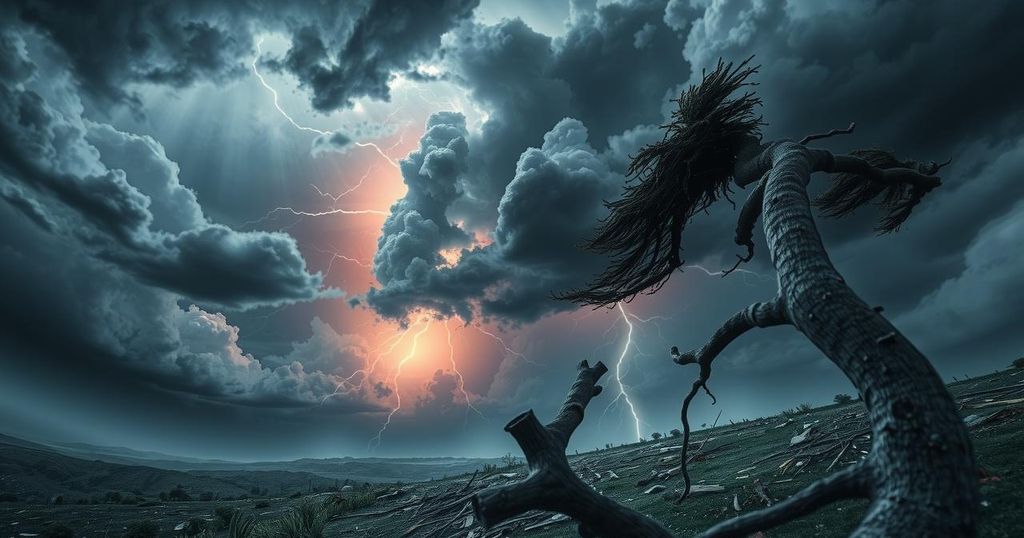Severe Winter Storm Storn Éowyn Disrupts Ireland and Scotland

A significant winter storm, Storn Éowyn, impacted Ireland and northern U.K., bringing hurricane-force winds and severe travel disruption. Gusts reached historic levels, leading to widespread power outages affecting hundreds of thousands. Authorities issued red weather alerts and urged residents to stay home to ensure safety. Experts warn of an increasing prevalence of such intense storms due to climate change.
A powerful winter storm swept through Ireland and parts of the U.K., prompting emergency responses as hurricane-force winds caused significant disruptions. Gusts reached up to 114 miles per hour, marking the most robust winds recorded since World War II. In anticipation of severe dangers, meteorological authorities issued a rare red weather alert throughout Ireland and central and southwestern Scotland. Numerous transportation networks faced cancellations, and major urban areas were eerily deserted as residents were urged to remain indoors.
Schools were closed, flights were canceled, and public transport ceased operations as the storm, known as Storn Éowyn, made its presence felt. Over 700,000 properties in Ireland and nearly 100,000 in Northern Ireland lost power due to extensive damage to the power grid. The storm, described as unprecedented by energy officials, swiftly passed through its trajectory. However, its impact lingered as communities experienced prolonged outages.
In urban centers like Dublin, Belfast, and Glasgow, quiet streets resembled the early days of the pandemic, as shops remained closed and residents heeded safety warnings. Both the First Minister of Northern Ireland and Scottish authorities emphasized the importance of safety, advising citizens to refrain from traveling during the worst conditions. Citizens struggled against severe wind gusts when caught outside.
Meteorologists linked the storm’s energy to an unusual weather pattern influenced by a recent snowstorm in the Gulf of the U.S. With a rapid drop in air pressure possible, the storm could become a bomb cyclone, indicating severe conditions. While understanding the climate change impact on such storms remains complex, scientists warn that warming atmospheres contribute to intensifying storms and increasing damages.
As highlighted by experts, the ongoing climate crisis may lead to more vigorous storms in the future. Such changes underscore the need for communities to prepare for heightened weather-related events. Storm Éowyn serves as a stark reminder of the unpredictability of nature and the pressing challenges posed by climate change.
The article discusses the implications of a severe winter storm, designated Storn Éowyn, that struck Ireland and parts of the U.K., specifically indicating the significant danger posed by hurricane-force winds. It outlines the emergency measures taken by local authorities, which included the issuance of rare weather warnings and widespread closures across major public services. The storm’s record-level wind gusts are contextualized within the ongoing discourse on climate change, suggesting a link between global warming and the increasing severity of such weather events.
The recent winter storm Storn Éowyn highlights the vulnerabilities faced by communities in the wake of extreme weather events exacerbated by climate change. Prompt emergency responses were crucial to ensure public safety as widespread disruptions were experienced across Ireland and northern U.K. cities. Experts warn of the future reality of increasingly severe storms due to warming climatic conditions, emphasizing the need for robust preparedness measures. Storn Éowyn serves as a striking reminder of how changing environmental patterns continue to challenge communities.
Original Source: www.thespec.com







